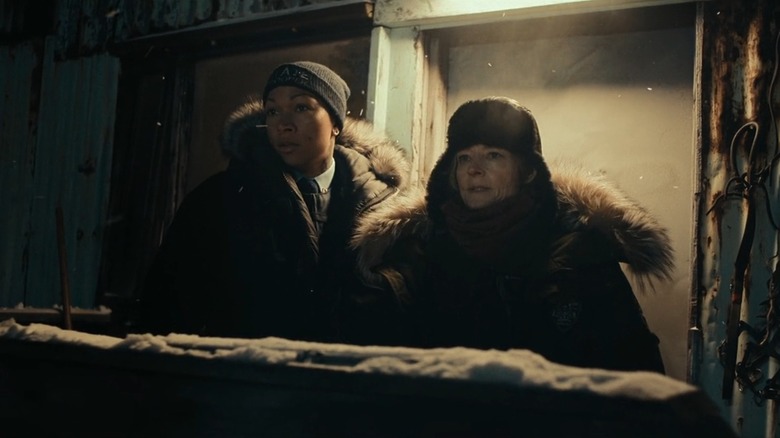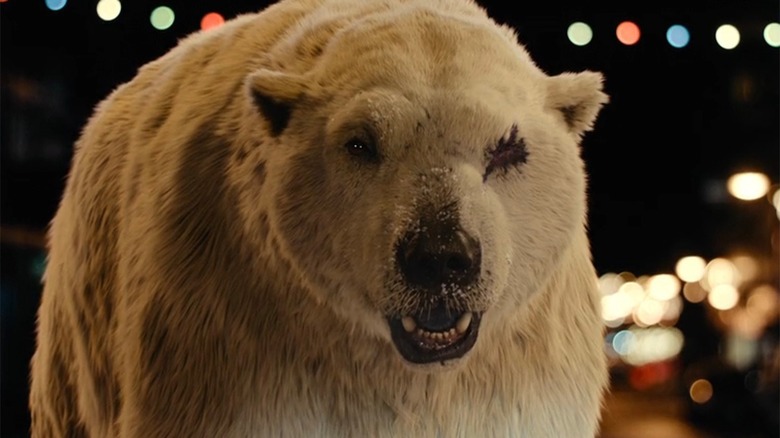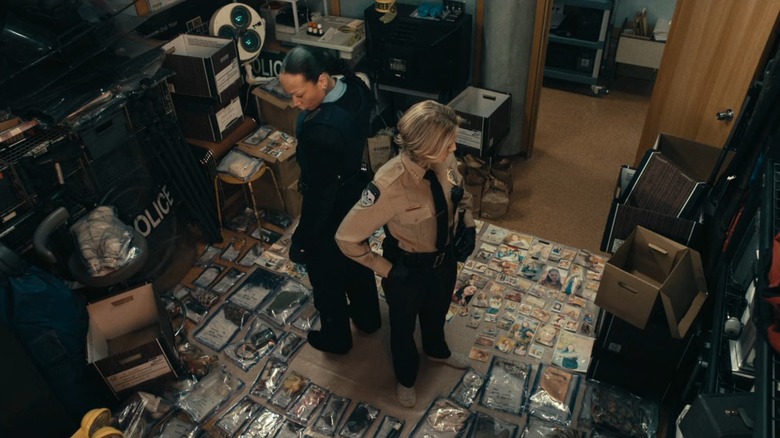True Detective: Night Country's Polar Bear Isn't The Season's Only Major Parallel With Lost
Warning: This article contains spoilers up to the latest episode of "True Detective: Night Country."
Right from the start, "True Detective: Night Country" came with almost sky-high expectations of everything it needed to live up to, both from within and without. Ever since season 1 of HBO's breakthrough 2014 series hit the ground running in one of the prestige network's most acclaimed and engrossing debuts ever, the ongoing fourth season faced all kinds of pressure to channel the best of the series' heyday. But as much as creator Issa López has managed to effectively bring things full circle, what about the show's more spiritual predecessors? In many ways, the first season's success in teasing out a central mystery that had most fans eager for a supernatural twist and introduced all sorts of unsettling mythology to obsess over hearkened back to another pop culture-defining phenomenon roughly ten years ahead of time — one that "Night Country" feels more beholden to than anything else.
Long before viewers scrambled to Google the Yellow King or spent hours puzzling out the true meaning behind that recurring spiral motif, "Lost" had all but defined the very notion of sending obsessive fan theorists down multiple rabbit holes, all in the hopes of finding a solution to unanswerable clues. Between the mysterious Numbers, the smoke monster, and, yes, that inexplicable polar bear in the middle of the jungle, the constant guessing games only added to the viewing experience. Simply put, nothing has even come close to replicating the lightning-in-a-bottle "it" factor that "Lost" consistently brought, episode in and episode out.
That is, until "True Detective: Night Country." For the first time in decades, we might just have another "Lost"-sized hit on our hands ... and the thematic similarities go far beyond polar bears appearing where they shouldn't.
Taking the polar plunge
Early on in "Lost," shocking visuals of the polar bear in the jungle quickly turned into shorthand among fans, neatly summing up the overall mystery-minded M.O. of creators Damon Lindelof and Carlton Cuse. Even if it ultimately turned out that they were writing checks they couldn't cash, stringing viewers along with a series of dizzyingly mounting questions that couldn't possibly be answered in any satisfactory way, the initial power of this approach taught an invaluable storytelling lesson. For several seasons, "Lost" proved that the journey is far more important than the destination. By balancing out all those lore-heavy teases with an impressive focus on character, "Lost" in its prime boasted the best of both worlds — and its enduring influence, even after a final season largely considered a disappointing mess, speaks for itself.
"True Detective: Night Country" may only be three episodes in — and, as a murder-mystery, fans surely (and rightfully) expect an ending that lives up to the potential thus far — but the overarching framework, tone, and atmosphere all feel perfectly reminiscent of "Lost" at its peak. There are plenty of plot-based details that will inevitably catch the eye, of course. The opening scene in the premiere of Tsalal Station researchers going about their day, a famous pop song blaring in the background just before things go horribly wrong, had to have reminded you of the unforgettable Desmond sequence that kicked off "Lost" season 2, no? How about the prominence of a "ghost" materializing in the wilderness, sharing knowledge that can't be explained naturally? And if that horrific "corpsicle" reveal didn't bring back memories of the eerie, "Guys, where are we?" jaw-dropper in "Lost," nothing will.
Yet all that said, the thematic similarities between "Night Country" and "Lost" are most striking of all.
Unpacking the mystery box
Fans of both "Lost" and "True Detective" are linked by a shared, implicit understanding that all of our nagging questions may not be resolved by the time the final end credits roll. Even before "Lost" ended rather divisively, it had become blatantly clear that certain ambiguous mysteries (like the initial importance of Walt, for instance) would have to remain as such, while others (hello, creepy whispering!) were doomed to feel far less interesting when given an answer. There's plenty of reason to hope that "True Detective: Night Country" will fully stick its landing, however ... not least of all because it seems to understand the why behind the success of "Lost."
As much as it gets a bad rap these days, the idea of the "mystery box" might as well be baked into the premise of a show all about solving grisly murders. "Lost" may have taken J.J. Abrams' infamous methodology to certain extremes, sure, but the writing team also realized that mysteries are meaningless without making us care about the characters involved. That's why "Lost" gave us extensive flashback scenes (a similar tactic that "Night Country" has relied on in brief, very literal flashes) and that's also why episode 3 brought back the classic "True Detective" trope of deeply philosophical discussions in cars. And in case the links between the shows weren't obvious enough, the conversation between Jodie Foster's Danvers and Kali Reis' Navarro centers on — of all things — faith vs science.
Ultimately, neither "Lost" nor "True Detective" need to be "solved" by fans. But by giving us plenty to chew over each and every week, Issa López just might recapture the best of what television can be.
New episodes of "True Detective: Night Country" air every Sunday on HBO.


